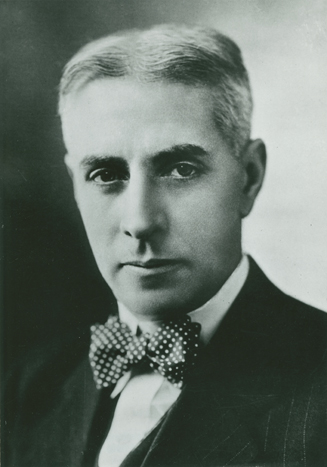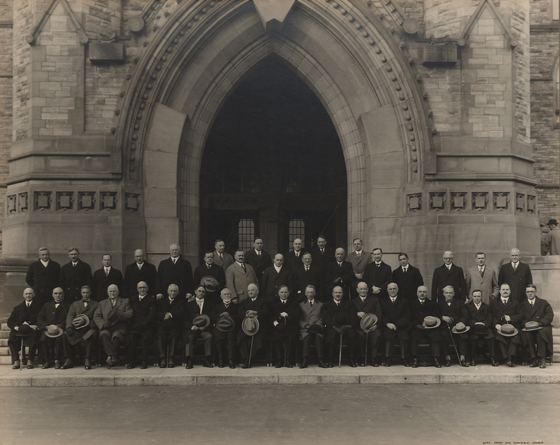Gordon Sidney Harrington (LLB’04, LLD’33): A life of service
By Mark Campbell
If anyone exemplifies the Weldon Tradition of public servic e that defines Schulich School of Law alumni, it’s Gordon Sidney Harrington (LLB’04, LLD’33).
e that defines Schulich School of Law alumni, it’s Gordon Sidney Harrington (LLB’04, LLD’33).
Nova Scotia’s 11th premier (1930-33) seemed to have an all-consuming passion to make a difference, whether it was fighting for the welfare of Cape Breton’s coal miners, serving in WWI and leading the effort that saw Canada take control over its armed forces, or the introduction of a minimum wage for women in the province’s workforce.
“He just seemed to have a genuine concern for people,” says Carole MacDonald, a former public servant and writer who is researching and writing a biography about Harrington. “I am convinced he did so to the detriment of his own health and his own desire to have a normal life.”
Strong family roots in public service
While personal details about him are relatively scarce, it’s clear from MacDonald’s research that Harrington’s career path and sense of duty likely had strong roots in family. His father, Charles Sidney Harrington, was a lawyer and Dalhousie professor who, with Robert Borden – Canada’s eighth prime minister – reportedly founded the Canadian Bar Association. His maternal grandfather, Dr. James DeWolf, helped found the Medical Society of Nova Scotia, served as president of the Nova Scotia Philanthropic Society and was superintendent of the Nova Scotia Hospital.
Although this background helps to explain how Harrington came to be interested in sociology and labour law, much about him still seems rather contradictory. He was a conservative party stalwart known for embracing socialism and defending communists. He came from a family of means but devoted himself to improving working conditions, wages and access to education among impoverished Nova Scotians. And he continually committed to engagement in public life and welfare even as he longed to commune with nature at his cottage on the Mira. Says MacDonald: “He had a love and a need for the great outdoors, for a normal life, but it kept evading him because of his sense of duty.”
Early impact as a young lawyer
Harrington first demonstrated a devotion to making a difference as a young lawyer in Glace Bay, where he served as counsel to the United Mine Workers of America District 26 in its 1909 battle against the more established Provincial Workmen’s Union. The PWU would prevail but Harrington, despite his support of the UMW and the ramifications of the dispute, earned the trust of miners in the region. He would continue to represent their interests over the next three decades as mayor of Glace Bay, MLA, Minister Mines, Public Works, Labour and Premier. During this time, he effectively resolved labour disputes, strengthened the provincial department of mining and, in 1925, launched a Royal Commission that not only settled a strike that had drawn nationwide attention, but also led to the end of British Empire Steel and its abuse of miners and their families.
“The Commission wasn’t simply about ensuring that miners in the region could make more money,” says MacDonald. “Harrington wanted it to look at everything from housing to working and living conditions. Through his efforts, he helped make Nova Scotia’s mines safer and the lives of miners better.”
Serving his country
When Canada joined the First World War, Harrington signed on to serve, enlisting, training and leading B company in the 185th Cape Breton Highlanders. But he would particularly distinguish himself as secretary and, later, deputy minister with the Overseas Ministry of the Forces of Canada (OMFC), a posting he received due in part to his mayoral experience.
During the war, the British War Office regularly raided Canadian troops to replace soldiers killed or wounded in battle. Harrington, as deputy minister, wrote a historic memo noting that Canadian Forces had been sent as a unit under Canadian control and administration to cooperate with other forces from the British Empire. Furthermore, the Canadian Government was responsible to the Canadian people for the general welfare of these forces. He recognized that these forces may be led by a British officer in battle but argued “The Canadian Government had not delegated its powers to any British authority in England or in the Field on questions of policy and administration.”
The Office returned the heavily edited memo, but Harrington effectively ignored it, setting Canada on a path toward independence as a nation. He subsequently saved Canada millions in reparations when he negotiated the final settlement between Britain and Canada following the war.
Improving lives
Back home, Harrington would continue his efforts to improve lives as a member and leader of the provincial government. He implemented Mother’s Allowance and Widow’s Allowance, providing financial assistance to low-income families. He worked to improve training for teachers. And he played a key role in the completion of the Cabot Trail. Yet there were disappointments. In 1935, Prime Minister R.B. Bennett brought Harrington to Ottawa to implement a national unemployment and social insurance program. But Bennett lost the election that fall and, unable to make progress under Prime Minister William Lyon Mackenzie King, Harrington returned to Nova Scotia.
Harrington found it hard to set aside his sense of duty, even when his health failed him. His willingness to make sacrifices for the common good is evident in a quote that ran in the March 4, 1933 edition of The Halifax Herald. Implored by opposition MLA M.R. Anderson to cut expenditures on social programs as a response to the great depression, Harrington replied:
“No, you’re wrong, Mr. Anderson, you will have to pay more taxes. And although I have taken a cut in salary, I too will be paying more taxes. In times like this, you cannot cut services to the poor. I have studied sociology and understand that when people don’t get what they need, they will take it. And the French revolution is not going to start in Nova Scotia.”
A role model for future Dalhousie alumni
Harrington’s conservatives would go on to lose the provincial election that year, but he retained his seat until 1937, representing the interests of Cape Breton. There were newspapers across Canada that suggested he could have succeeded R. B. Bennett as leader of the federal Conservative Party, but it’s likely Harrington would have declined any such offer.
Still, the desire to make a difference remained strong in Harrington all his life. Just days before he passed away on July 4, 1943, he wrote economics instructor and future senate member Eugene Forsey to say “my old will to do something for humanity is still with me.” That spirit, dedication and determination to make a difference sets an example for all Dalhousie alumni, and Nova Scotians in general, to follow.
